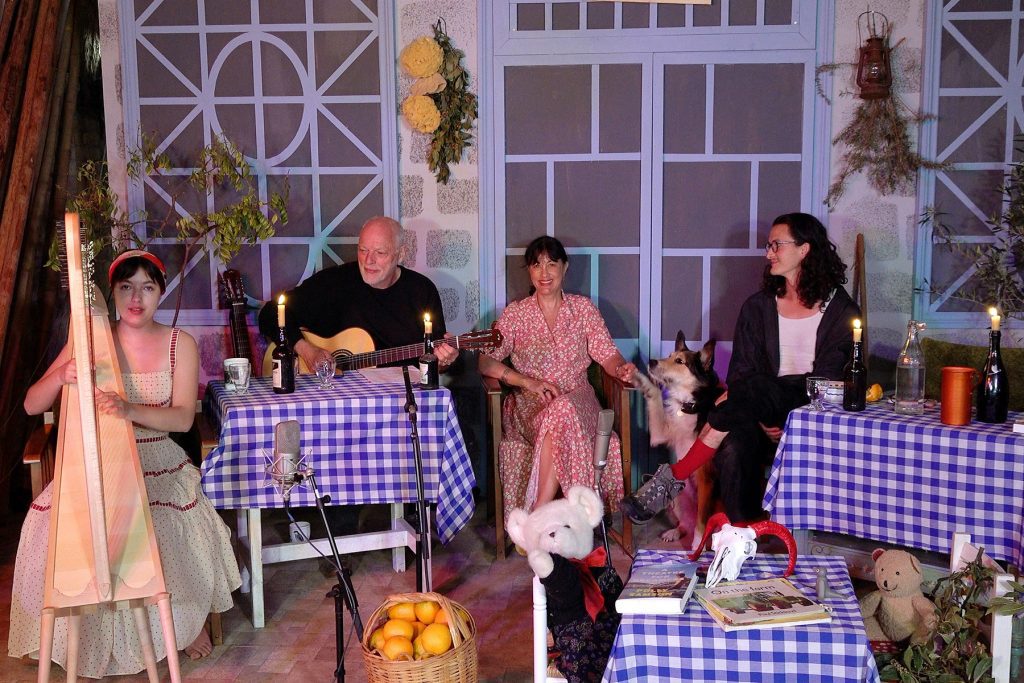
David Gilmour and Polly Samson on What Keeps Their Creative Partnership Strong
It’s a late-May afternoon, and Polly Samson and her husband, former Pink Floyd frontman David Gilmour, are seated side-by-side for a Zoom interview in what looks like a Greek restaurant with brick walls and windows fashioned in ornate geometric shapes. It’s the perfect setting to discuss Samson’s latest novel, A Theater for Dreamers, which is about a group of artists, including Leonard Cohen and his muse Marianne Ihlen, who lived on the Greek island of Hydra in 1960, and how men and women work (or don’t work) creatively together.
“David has always been incredibly, incredibly supportive of me,” Samson says. “There’s a motif in A Theater for Dreamers that starts when Leonard says how lovely it would be if he had a gardenia and a sandwich placed on his desk every day. So the thing I was examining in the book really was, ‘Who gets to put the gardenia there and why?’ And in our relationship, we take it in turns. David is as likely to get me a gardenia and a sandwich as I am to get him one.”
blogherads.adq.push(function () {
blogherads
.defineSlot( ‘medrec’, ‘gpt-dsk-tab-article-inbody1-uid0’ )
.setTargeting( ‘pos’, [“mid-article”,”mid”,”in-article1″,”mid-article1″] )
.setSubAdUnitPath(“music//article//inbody1”)
.addSize([[300,250],[620,350],[2,2],[3,3],[2,4],[4,2]])
;
});
“And a cup of tea,” he adds, making her laugh.
While the couplings of artistic women and men in the book are mostly dysfunctional, Samson and Gilmour have never had that problem. They started dating in 1992 and married a couple of years later, shortly after Samson, who previously worked as a journalist, had written lyrics for Pink Floyd’s The Division Bell album. She has contributed words to each subsequent Gilmour or Pink Floyd release, and he has rallied behind her career since she made her first foray into fiction with 2000’s Lying in Bed.
The spark for A Theater for Dreamers came in May 2014 after Samson finished reading Australian author Charmian Clift’s Peel Me a Lotus, an account of her time in Hydra with her husband, author George Johnston. Samson, who was on vacation in Hydra at the time, became fascinated by Clift’s writings, as well as the discovery of more than a thousand photos of Clift, Cohen, and others on the island in 1960. Her interest soon turned to obsession, and she subsequently visited Hydra several times, stationing herself in Clift and Johnston’s former abode as she wrote the novel and researched the history of the island and its famous inhabitants for the next four years. (The author’s interest in Clift has subsequently led to a reissue of Peel Me a Lotus, due out this fall with an introduction by Samson.) During the time she was writing A Theater for Dreamers, Gilmour helped her with her research in between his own recording sessions and touring.
The couple returned home from their most recent trip to Hydra in March 2020, the same month that Covid lockdowns went into effect. Samson’s book came out in the U.K. the following month. They’d originally planned on holding in-person events to promote the book, but quickly pivoted to livestreams, which brought them back to Greece virtually since their son and daughter-in-law designed a set to look like a Greek restaurant — where they’re seated during their conversation with IndieLand — on their farm in England. The whole clan would gather for these and started joking that they were the Von Trapped Family. Samson would read from the book and answer questions about it, while Gilmour played songs by Cohen and his own original “Yes, I Have Ghosts,” based on the book.
Since the first of these events, Gilmour served as “producer, engineer, editor, everything” for a homemade audiobook recording of A Theater for Dreamers, which features Samson’s narration, and added his own folky, Greek-inspired instrumental interludes between chapters and some ambient sounds he recorded on their visits to Hydra. When the recording was done, they collaborated on “Yes, I Have Ghosts,” a song with lyrics inspired by Clift, which Gilmour recorded with the couple’s daughter Romany, to accompany its release.
blogherads.adq.push(function () {
blogherads
.defineSlot( ‘medrec’, ‘gpt-dsk-tab-article-inbody2-uid1’ )
.setTargeting( ‘pos’, [“mid-article2″,”mid”,”in-article2″,”mid-article”] )
.setSubAdUnitPath(“music//article//inbody2”)
.addSize([[300,250],[300,251],[620,350],[2,4],[4,2],[3,3]])
.setLazyLoadMultiplier(2)
;
});
The couple has also been collaborating on songs for an upcoming Gilmour solo album, and Gilmour has been working behind-the-scenes on a reissue of Pink Floyd’s Animals album. Although he addresses his rift with former Pink Floyd member Roger Waters about the release here, this interview was conducted before Waters targeted Gilmour in a caustic missive about the re-release. Asked for his reaction to Waters’ claims before publishing this interview, Gilmour had no further comment.
But other than a moment where Gilmour tenses up about Waters, they are in warm spirits throughout the conversation. “We like working together and like involving each other in our work,” Gilmour says of how their marriage and creativity work together. “And we love each other, of course.”
Polly, you started writing A Theater for Dreamers after reading Charmian Clift’s Peel Me a Lotus. David, how did you help her with research?
Gilmour: Polly was very, very busy working away like a slave in her hut. And she would text me or summon me and say, “I need to know about this.” And I would go off into the depths of Google and track things down and present them to her.
Samson: The thing is, I can’t have the internet where I write because it’s too distracting. So I’d just say something like, “Could you check something for me about 1960?” Writing the book was quite an immersive thing and the research was huge, because all of those people who were there were all writers to some degree, and they all had archives. It was like literary detective work. And we just got really into it.
Gilmour: We kind of lived and breathed 1960 Hydra and Leonard’s music for four years. Nothing else virtually.
Did you learn anything new about Leonard Cohen while researching the book?
Samson: I’m a huge fan, but I had never researched the man. I loved the music so much, but I kind of didn’t want to know anything about the man. Because of [his persona as a] “ladies’ man,” I thought I probably wasn’t going to like him. So I never read any biographies or looked into him. But once I did, the thing that surprised me was how incredibly much I did like him, how great he is, how honest he is, how all these sorts of assumptions I had made about him turned out not to be true.
blogherads.adq.push(function () {
blogherads
.defineSlot( ‘medrec’, ‘gpt-dsk-tab-inbodyX-uid2’ )
.setTargeting( ‘pos’, [“mid”,”mid-articleX”,”in-articleX”,”mid-article”] )
.setSubAdUnitPath(“music//article//inbodyX”)
.addSize([[300,250],[300,251],[3,3],[620,350]])
.setLazyLoadMultiplier(2)
;
});
What changed your mind?
Samson: The best bit of research, I think, was that I got to read years’ and years’ worth of letters from him to Marianne. You got the sense of a man who never made false promises. He knew that he was likely to slip into depression and that he couldn’t make promises of a domestic nature, and so he didn’t. He always told people, certainly Marianne, “I can’t be the man you want me to be.” So actually, I ended up in a lovely situation, which was I liked both the music and as a bonus, the man. He’s sort of honorable, I think.
Was it easy to find the voice of Leonard for the audiobook?
Samson: The first time I recorded it, we played it to our family and everyone started getting in hysterics because my take on Leonard sounded like Eeyore, and George Johnston sounded like Sir Les Patterson. As a nonprofessional, you’ve no idea what to do. You’ve really got to tone those accents down, and I’d really let rip. So we had to go back and redo all the spoken parts, so they weren’t so depressing or “Strine” [Australian accented].
David, you wrote some Greek-inspired musical interludes for the audiobook. How did you find that sound?
Gilmour: It all started with the music for what became the song, “Yes, I Have Ghosts,” which was more [inspired by] Leonard, I suppose, than Greek music. But I have got a mandolin here, which I actually played on the Wall shows, back in the mists of time. And I’ve got a Turkish instrument called a cümbüş, which is a 12-string fretless banjo. I’m not particularly adept at these things, but I started making that first song and it just said to me, you know, a mandolin on here would be lovely.
Samson: And you’ve spent a lot of time in Greece.
Gilmour: I have spent a lot of time in my life in Greece, and I do know and love Greek music. And this whole project pushed me towards that a little bit more.
“I have ghosts, not all of them dead” is a line of dialogue in the book. How did that idea become a song?
Samson: Usually, our songs start with the music first, but this was actually lyrics first. As soon as I’d written that line, I knew it was going to be a lyric. That idea of being haunted by people who are still alive, those are the true hauntings. Anyone who’s had a rift will identify with that feeling of constantly thinking that you’ve seen someone out of a train window or walking past and you think it’s that person that you used to have such a connection with or who’s been taken away from you for whatever reason — war, love affairs gone wrong. We all have them. Because I was so immersed in the book, I just wrote that line on a Post-it note and came in quite excited and said to David, “When I finish this book, I’m going to write this lyric.”
Gilmour: I think the music and lyrics came up separately and jointly, but worked together very well. I did spend two or three days working really hard on something that I just thought, “No, it’s not working,” and binned it after two or three days. And the minute I threw it away, that basic thing leapt out at me, and it all took shape very, very quickly from there.
How has your approach to writing music together changed over the last 27 years?
Samson: I don’t hide anymore [laughs].
blogherads.adq.push(function () {
blogherads
.defineSlot( ‘medrec’, ‘gpt-dsk-tab-inbodyX-uid3’ )
.setTargeting( ‘pos’, [“mid”,”mid-articleX”,”in-articleX”,”mid-article”] )
.setSubAdUnitPath(“music//article//inbodyX”)
.addSize([[300,250],[300,251],[3,3],[620,350]])
.setLazyLoadMultiplier(2)
;
});
What do you mean by that?
Samson: The first time I wrote lyrics, I got a pretty bad response from David’s former lyricist which really kind of stung at the time. It shouldn’t have, but I didn’t know anything about these things at the time. When I first wrote lyrics on [Pink Floyd’s] The Division Bell, I didn’t want my name on it because we just lived in a time where things were really sexist.
Gilmour: “I think I’ll get tortured and murdered by legions of angry fans.”
Samson: And in fact, the angriest fan of all was the person [Roger Waters] who said, “Oh, how tragic, getting the wife to write lyrics.” And I wasn’t even his wife. And anyway, what difference does being married make? So I felt like I hadn’t really wanted to stick my head above the parapet, and David forced me to.
Gilmour: Initially, she was trying to make me write the lyrics and just be there to nudge and remind and critique. But I quickly forced her into a more prominent role, which she then had to take some credit for.
Samson: Now I don’t feel like I need to hide anything. I think it’s perfectly OK. I can write lyrics. And being a wife doesn’t disqualify me. Being female doesn’t disqualify me. And it’s all fine.

Samson and Gilmour at London’s Olympic Studio, 1993 (during the writing/recording of <em>The Division Bell</em>).
© Jeremy Young
One of the threads in your book is the nature of creative women in relationships with creative men. Charmian Clift at one point says, “My work only gets done in the margins of [George Johnston’s] work.” What did you make of the difference between them and you as you were writing it?
Samson: It gives you this huge feeling of relief that you don’t live in 1960 and that it’s perfectly OK to help each other. No one really minds.
Gilmour: [Smiling dryly] I’m sure there are a few.
Samson: The one that gets me is when people kind of go, “Oh, Yoko Ono.” And you sort of think, “That’s fucking great. Yeah, I’ll take it.” Yoko is an artist in her eighties doing really interesting, innovative work. Thanks [laughs].
Gilmour: Yoko is a very highly respected artist in her own right. And it’s not an insult.
Samson: And she didn’t break up the Beatles any more than I broke up whatever it was I’m to have broken up. What did I break up?
Gilmour: Nothing, darling. You didn’t break up anything. That happened several years before we met.
Samson: Oh, good [laughs].
The two of you showed how you support each other with your Von Trapped broadcasts. David, you performed a lot of Leonard Cohen’s songs on those. What did you learn from playing his songs?
Gilmour: One thing I did learn is how bloody good he is as a guitar player. You tend to think of singer-songwriters as people who are just using the guitar accompaniment to carry the words that they’re doing, but Leonard was an absolutely brilliantly accomplished guitar player in fingerstyle things that I just cannot do. And of course, he’s about the best lyricist that I know of.
blogherads.adq.push(function () {
blogherads
.defineSlot( ‘medrec’, ‘gpt-dsk-tab-inbodyX-uid4’ )
.setTargeting( ‘pos’, [“mid”,”mid-articleX”,”in-articleX”,”mid-article”] )
.setSubAdUnitPath(“music//article//inbodyX”)
.addSize([[300,250],[300,251],[3,3],[620,350]])
.setLazyLoadMultiplier(2)
;
});
You also performed a couple of solo songs by your old bandmate and friend, Syd Barrett, “Octopus” and “Dominos.” You said you were proofreading a book of his lyrics. Did you gain any new perspectives on him from that?
Gilmour: Well, you know, I produced and played on those songs originally, way back when in ’69 or whenever it was, and knew him well. For the lyric book, I sat here for months, really much more time than I should have, with the original multitracks on digital so that I could solo his voice and listen to exactly what he was saying. Some of the time, I just couldn’t work out what he was saying. And on other occasions he says different things on different versions of the same song, double tracking his own voice and different words are coming out. The title of the first album is The Madcap Laughs. And on some [versions of “Octopus”] he sings “the mad cat laughs,” with a “T” in cat, and some he sings “madcap.” And I was really worried about whether I should change it all to “the mad cat laughs,” and that would make the title of his album incorrect. But as he had sung both of them, I decided we’d would stick with the way it was. They were quite hard to decipher them because they don’t follow what we would normally see as a common sense in a linear way.
Do you think that writing lyrics was a stream-of-consciousness process for him, then?
Gilmour: Hmm. I don’t know about that. I think he worked very hard on these things, and it looked, to me even, like he just sort of made him up as he went along.
Samson: Did he not write anything down?
Gilmour: I don’t even remember. I think he must have had them written down, but he never delivered any pieces of paper with them written down to a publisher or anything. And there were no lyrics on the albums originally. So the only way that this book has been possible is by listening and writing those lyrics. And I did most of it.
When I listened to the audiobook of A Theater for Dreamers, I found a parallel with Syd’s life. In the novel, the character Marianne talks about her son taking LSD once and how it ruined him. The idea that acid wrecked Syd is obviously the popular myth. A few years back, though, Nick Mason has said he thought that while LSD worsened Syd’s state, he thinks it was more that Syd just didn’t want to be in a rock band anymore. What do you make of that?
Gilmour: Well, I mean, I think one of those things fell into the other. Syd, up to the age of 20, was as normal as any human being could be. There was no sign of any of these things cropping up. So basically, I’ve no idea. He certainly wasn’t averse to taking almost any drug that anyone would give him. And a lot of the rather strange coterie of fans gathered around him were into thinking it was a romantic thing to provide him with drugs.
Samson: Is that because what they wanted to say, “I did a trip with Syd Barrett”?
Gilmour: Yeah. And that they were helping him because that was what he wanted. And I don’t think many of those people, some of whom I knew vaguely, had any conscience about what they were doing to him. And it seemed rather obvious to me and various other people that it was not a good idea. There are people who take one trip or even smoke one joint and their lives are affected by that in a bad way forever. There are others who are affected by it in a good way forever.
blogherads.adq.push(function () {
blogherads
.defineSlot( ‘medrec’, ‘gpt-dsk-tab-inbodyX-uid5’ )
.setTargeting( ‘pos’, [“mid”,”mid-articleX”,”in-articleX”,”mid-article”] )
.setSubAdUnitPath(“music//article//inbodyX”)
.addSize([[300,250],[300,251],[3,3],[620,350]])
.setLazyLoadMultiplier(2)
;
});
Getting back to the audiobook, David, you’ve said that you thought more musicians should collaborate with authors on the format. Do you see yourself working on more audiobooks?
Gilmour: We don’t have a plan. I mean, Polly’s going to write another book one of these days, and I will probably make some more music one of these days.
Samson: Well, you are now [laughs].
Gilmour: Yes, I am trying to make some music and that collaboration will undoubtedly continue.
Is the new music Leonard Cohen–esque?
Gilmour: Well, there’s a number of things that come from before this whole period, from before my last album, which are the things that I’m playing with to some extent, as well as some new music, too, to get myself back into the mood for work.

Gdansk Shipyard, Poland 2006 (<em>On an Island</em> tour)
© Anna Wloch
blogherads.adq.push(function () {
blogherads
.defineSlot( ‘medrec’, ‘gpt-dsk-tab-inbodyX-uid6’ )
.setTargeting( ‘pos’, [“mid”,”mid-articleX”,”in-articleX”,”mid-article”] )
.setSubAdUnitPath(“music//article//inbodyX”)
.addSize([[300,250],[300,251],[3,3],[620,350]])
.setLazyLoadMultiplier(2)
;
});
How soon do you think you’ll be putting out a new album?
Gilmour: I’m hoping that I will have an album ready in the next year or two; I’m not that fast. One of the problems, of course, is this lockdown thing. We are now both double vaccinated, so things are looking a little bit brighter. But getting other people in to listen, to help, and to play on things has been kind of impossible in the last year. I do look forward to actually playing some songs with a bunch of actual musicians at some point.
I assume you haven’t been working strictly acoustically — in the vein of “Yes, I Have Ghosts” — but has lockdown made you think differently about how you write?
Samson: Guitar and harp is your next album [laughs].
Gilmour: I think there’ll be more harp. And the tricky bit will be how to tie all the various disparate sounds together into a homogenous whole.
Samson: It’d be a shame to never play electric guitar again.
Gilmour: I will play electric guitar again. But the electric guitar I’m currently playing is just not quite as “rock god” as one might expect.
Samson: See, you shouldn’t have sold them, should you? [Laughs.]
Gilmour: I’ve got plenty of lovely guitars left.
Do you want to tour again?
Gilmour: I haven’t given that a moment’s thought yet, but we had a lovely time on the last tour we did. I played South America for the first time. It was very gratifying and lovely. At this very moment, playing to a group of 10,000 people, tightly packed together in an arena, is a nightmare, so I wouldn’t want to do that. So we’ve got to let a little time pass.
Is there anything going on with Pink Floyd on the archival front? There’s been talk of an Animals reissue in recent years.
Gilmour: Well, a very lovely Animals remix has been done, but someone has tried to force some liner notes on it that I haven’t approved and, um, someone is digging his heels and not allowing it to be released.
Samson: But you don’t have liner notes, do you?
Gilmour: No, we’ve never had liner notes.
Samson: Why are you suddenly having liner notes?
Gilmour: Because someone wants them, and they got a journalist to write some, and I didn’t approve them. And he’s just getting a bit shirty. You know how he is, poor boy.
I hope you’re able to reach a détente at some point.
Gilmour: Pretty unlikely, I’m afraid. There’s a lot of misinformation. And I’m not keen on constantly responding to every bit of untruth that I hear about myself and what I’m doing.
blogherads.adq.push(function () {
blogherads
.defineSlot( ‘medrec’, ‘gpt-dsk-tab-inbodyX-uid7’ )
.setTargeting( ‘pos’, [“mid”,”mid-articleX”,”in-articleX”,”mid-article”] )
.setSubAdUnitPath(“music//article//inbodyX”)
.addSize([[300,250],[300,251],[3,3],[620,350]])
.setLazyLoadMultiplier(2)
;
});
Is there anything you’d like to clear up?
Samson: How long you got? [Both laugh.]
Gilmour: There are packs of lies and information I’ve allowed to sit out there but my general view is to swallow and … it’ll all come right one day in one way or another.
To end things on a positive note, what’s been giving you hope lately for the future?
Samson: The world returning to something that’s not normal, but a better version of normal. Maybe people having learned something about the things they like and the things they can do without.
Gilmour: This wonderful Zoom situation is giving me hope. Previously, lots of banking and investment and God knows what sort of businesspeople were flying to New York for a meeting and then flying back. Hopefully, air miles will be reduced quite considerably by these technological advances which have been forced on us.
You’ve long been passionate about fighting climate change. Maybe the positive effects of the past year will get through to people reluctant to acknowledge that it’s a real crisis.
Gilmour: Well, that’s a lot of people to whom it’s not getting through. But the law is becoming more on the side of the right thing. One lives in hope.




